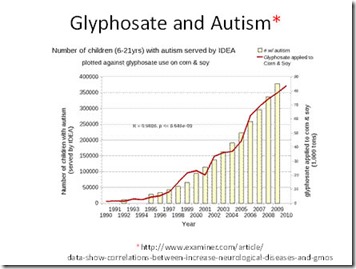Evidence could be mounting that Monsanto’s wonder weed killer could be having a detrimental effect on human beings.
Research published in the International Journal of Toxicology3 in January (2014) reveals that “glyphosate-based formulations like Roundup pose a threat to human health through cytotoxicity and oxidative effects. Such formulations were also found to be lethal to human liver cells.”
The article goes on to state: “You may think you are safe if you only eat organic produce but nothing could be further from the truth as most of the glyphosate contaminated crops are fed to animals. This means you also need to get organic meat and eggs. Also, beware you CANNOT wash glyphosate off your produce as it is actively integrated into every cell in the plant and impossible to wash off.” (See more of the article here)
Dr Stephanie Seneff has been conducting research at MIT for over three decades. Her research has uncovered significant correlations between the increased use of Glyphosate – the active ingredient in the herbicide, Round-up.
For the past 30 years, Dr Seneff has been passionate about teasing out potential causes of autism, after seeing what it was like for a close friend whose son was diagnosed. She points out the clear correlations between increased glyphosate use over recent years (the result of genetically engineered crops causing weed resistance, necessitating ever-larger amounts to be used) and skyrocketing autism rates.
This is the comparative graph of the rise in autism and the use of the herbicide that Dr Seneff’s research has revealed:
She points out that the rate of autism has risen so quickly, there can be no doubt that it has an environmental cause. “Our genes simply cannot mutate fast enough to account for the rapid rise we’re now seeing. The latest statistics released by the CDC on March 20 show that 1 in 50 children in the US now fall within the autism spectrum2,3, with a 5:1 boy to girl ratio. Just last year the CDC reported a rate of 1 in 88, which represented a 23% increase since 2010, and 78% since 2007.”
If you listen to te video interview you will hear that exposure to Glyphosate either directly or in our food can cause:
- Gut dysbiosis (imbalances in gut bacteria, inflammation, leaky gut, food allergies such as gluten intolerance)
- Disrupted sulfur metabolism / sulfur and sulfate deficiency
Her research and related articles on the website Mercola.com make fascinating but horrifying reading.
An eco-friendly option to try
From Wendyl’s Green Goddess newsletter comes this welcome recipe. The ingredient should be readily available anywhere in the world, but I have added the contact for New Zealand readers to buy from Wendyl’s website:
Wendyl’s Wild Weedkiller
1kg tub of soda ash
Warm water to make up to 3 litres
Pour the soda ash into a bucket or your weed sprayer then top up with warm water until you have three litres. Shake to dissolve and then spray. Make sure the foliage is quite wet and please do this on a sunny day. You don’t want rain to wash it off. Leave to dry and you will notice a browning off of the plant within hours.
Click here to buy 1kg tubs of soda ash on our website or pop into our shop at 515 Great North Rd, Grey Lynn.


Hi Heather
I sent this article to one of the parents at school, who work for DOC.
Claire saw me today, as she worked in the school garden and said: Thank you for sending that article, it was very interesting.
We started chatting and I told her about your other article about solar energy. She said, she would be interested in that one, too.
So that was nice, eh?
I’ll keep you posted!
Jose
LikeLike
Hi Heather
Another great article. I never liked killing weeds with Roundup and have tried using boiling water, which was quite effective at times, too!
What terrible statistics about the increase in autism in children!
Keep going with your info, it’s very important.
Jose
LikeLike